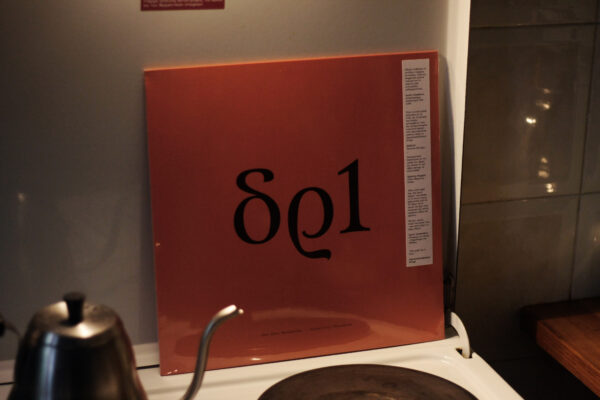 release date: December 6th, 2021
release date: December 6th, 2021
available format: 12”, Digital
catalogue#: orl29 / REKEM 10 / AAR 003
title: On the Administration of Panic (The magazine issue 1)
artist: Dimosioypalliliko Retire
*
*Re-press Alert*
Still relevant after all these years, Dimosioypalliliko Retire’s ‘On the Administration of Panic’ was reissued in 2016, bringing the band closer to new ears and to a new generation of listeners. With a sui-generis critical approach to both music and the everyday, each new listen offers breaths of fresh air but also raises unforeseen questions.
Their caustic humour brightened us up, and their sharp gaze gave strength and relief to many. The music on the other hand touched us, and somewhat unexpectedly some of it even managed to move a few bodies on a dancefloor or two. But the LP sold out. As we patiently wait for more of the band’s material to come back to the surface, we repressed the first album so that no one would miss it.
Dimosioypalliliko Retire 1984-2006
The group Dimosioypalliliko Retire (translates to “Public Sector Worker Penthouse”) was formed in 1984 by Ntanis Tragopoulos, Alexandra Katsiani and Thanasis Chondros. It was initially active in live performances and subsequently with recordings, up until 2006 when it completed its course. In essence D.R. involved itself in a radical application of the era’s modes of expression and media, in manners that were particularly edifying, paradoxical and humorous. Their appearances were centred in performance art, with music appearing sometimes in the foreground and other times in a supporting role.

The result itself was often closer to the features of a school play or a debased news broadcast, rather than a music concert. D.R.’s first appearance took place in an unfinished building site in Thessaloniki (October 1984), and other appearances followed in venues such as farmer’s markets, parks, university halls and political youth festivals.
In their own words:
“Alexandra had a pot with a bushy plant on top of her head, when we performed at the building site. The idea then was that the music would work as a pretext for a series of unexpected invasions within the public space. People started inviting us to various places, for events taking place in the school of Architecture, or at the festival organised by Aygi (independent leftist newspaper) where we were cracking walnuts as a reference to Kafka who wrote in Josephine (“Josephine the Singer, or the Mouse Folk”) that cracking walnuts is not art.
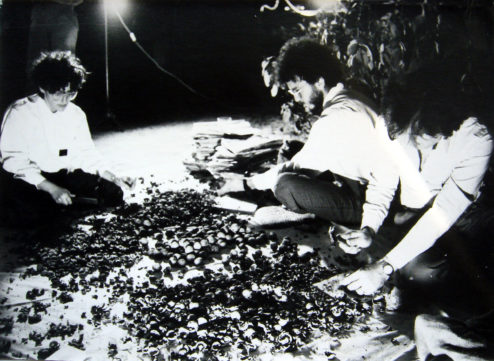
We played in Volos and also in Piraeus at the last National Visual Arts show where we set up a dinner table and ate accompanied by a metronome. All the while we had began recording, and as time went by recordings became more frequent and appearances fewer and far between. In February of 1989, “Alli Pleyra” (Other Side) appeared on vinyl, and we also contributed work to a number of compilations abroad. Afterwards Thanasis and Alexandra were away in Sweden so we didn’t keep up the same pace. We did write a number of pieces though -still unreleased- as well as “Ianus” which appeared later on in 1995. Just as the Roman god Ianus had two faces, the work carrying his name had two parts, each of them to be broadcast from a different radio station. The two broadcasts were meant to take place at the same time and the piece was to be listened to through two separate radios. This was never realised. In 1999 we released “Party” at a time when the bombings in Yugoslavia were still on-going. It referenced the events at the time through abstracts of speeches made by key actors. In 2002 we started the magazine. In 2003 we took part in the “Gates” performance, organised by an Italian curator, and this was our last public appearance”.
Interview with Lorie Keza, Vima, 2005
On the administration of panic (the magazine issue 1)
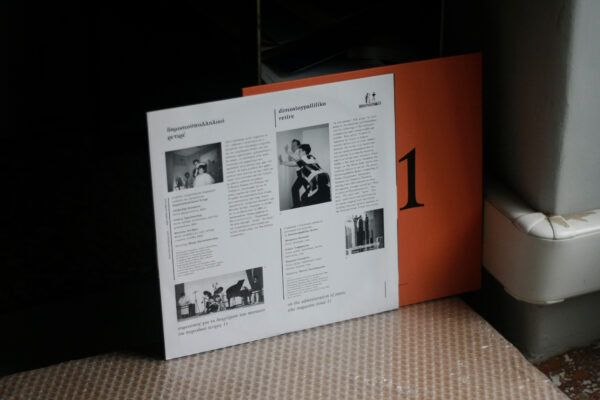
This record is a reissue of the first issue of the verbal “magazine”, published on CD-r by Dimosioypalliliko Retire in 2002 (D.R. 1, Another City, Thessaloniki). Lasting until 2006, 9 issues appeared in total. “In this attempt”, D.R. noted, “we were aided by the autonomy and immediacy that the technology of the recordable compact disc and a home studio can provide. We urge our listeners, if they like what they hear, to copy it and pass it on to their friends. Copies help music spread, they don’t kill it as record companies claim. We want to produce an evolving work. Either way, music is tied to time since it has duration, but we also wanted to play with real time, to actually have the magazine unfold from issue to issue, following our whims at the time. This way we had the chance to have changes in character and style that would not have fit within the boundaries of a work that takes place within a single record”. The first issue then, contains the musical part of the performance titled, “On the administration of panic”, which took place on the 31st of May 2002 at Moni Lazariston in Thessaloniki, during the Strange Screen festival. You can watch an excerpt from the performance here.
Dimosioypalliliko Retire today
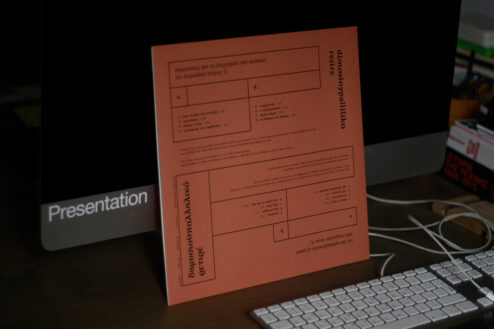
Every one of us leaves traces. How many of those remain? For how long? And what is the meaning they take upon them as time goes by? Who has use for the past? We perceive time (in the western mind at least) through change, and in societies such as ours that evolve rapidly, values (political, social, aesthetic and ethic) show a remarkable fluidity. As much as the present incorporates pieces of the past, the question remains. The reissue of the first issue of the audio magazine of Dimosioypalliliko Retire, constitutes an attempt for an answer. It appears so current that even reviews at the time of the first issue, such as that by Christos Karras, read as if written today:
“On the administration of panic (the magazine issue 1) consists of an interesting and original multimedia application that combines social commentary, humor, music and theatre. And throughout its pluralism of ideas and intents, nothing stays safe or beyond D.R.’s aim, neither the complacency of passivity, nor mindlessly reproduced clichés and TV kitsch, not even the petit-bourgeoisie, the pornography of media, or the modern Greek reality, and the mockery of politics”.
Christos Karras, Overdub zine, 2003
Buy on Bandcamp:
Release Notes
Co-released with Rekem Records and Agios Anthropos
Edition of 300 copies
Mastering: Themis Pantelopoulos
Sleeve design by Bend
./ ..
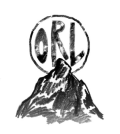
Comments are closed.